Unit 3 How do you get to school期中复习重点知识解析练习(无答案)人教版七年级下册
文档属性
| 名称 | Unit 3 How do you get to school期中复习重点知识解析练习(无答案)人教版七年级下册 |
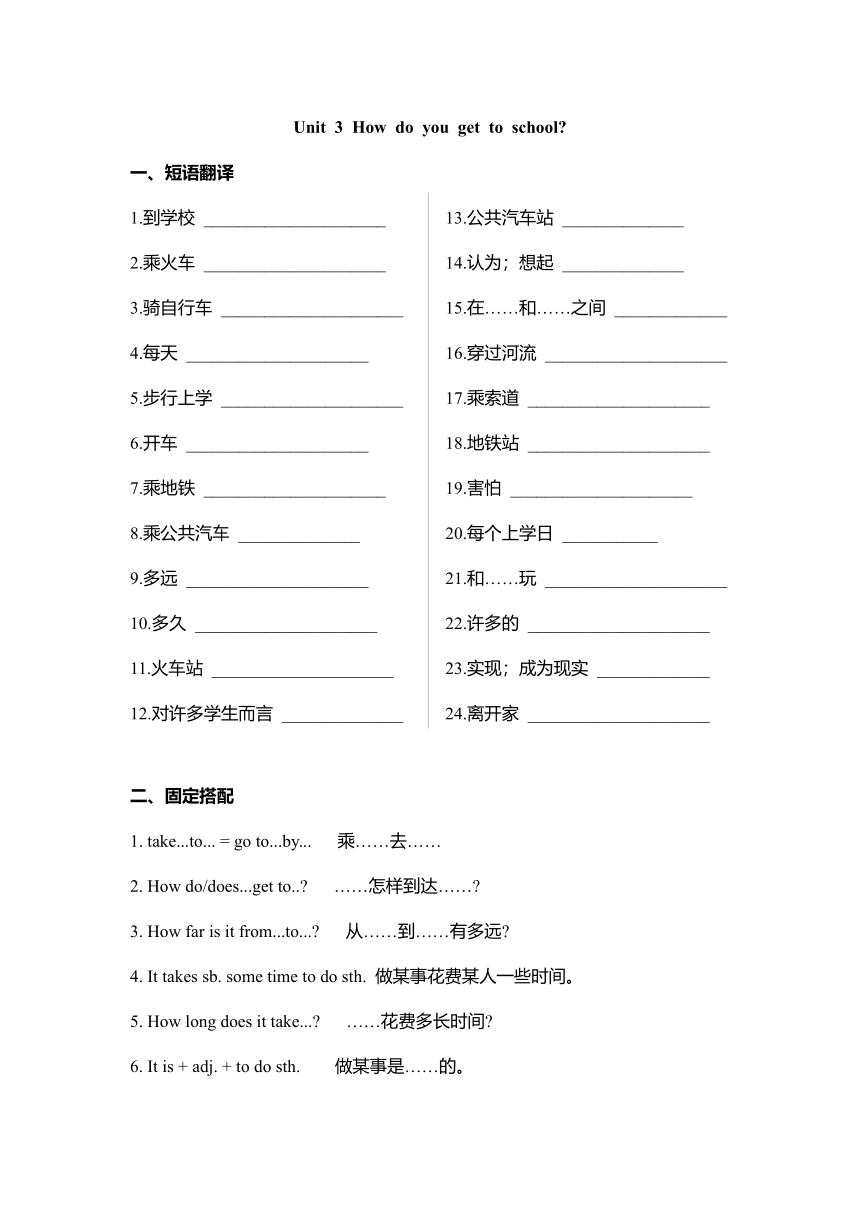
|
|
| 格式 | docx | ||
| 文件大小 | 28.6KB | ||
| 资源类型 | 教案 | ||
| 版本资源 | 人教新目标(Go for it)版 | ||
| 科目 | 英语 | ||
| 更新时间 | 2024-04-19 00:00:00 | ||
图片预览

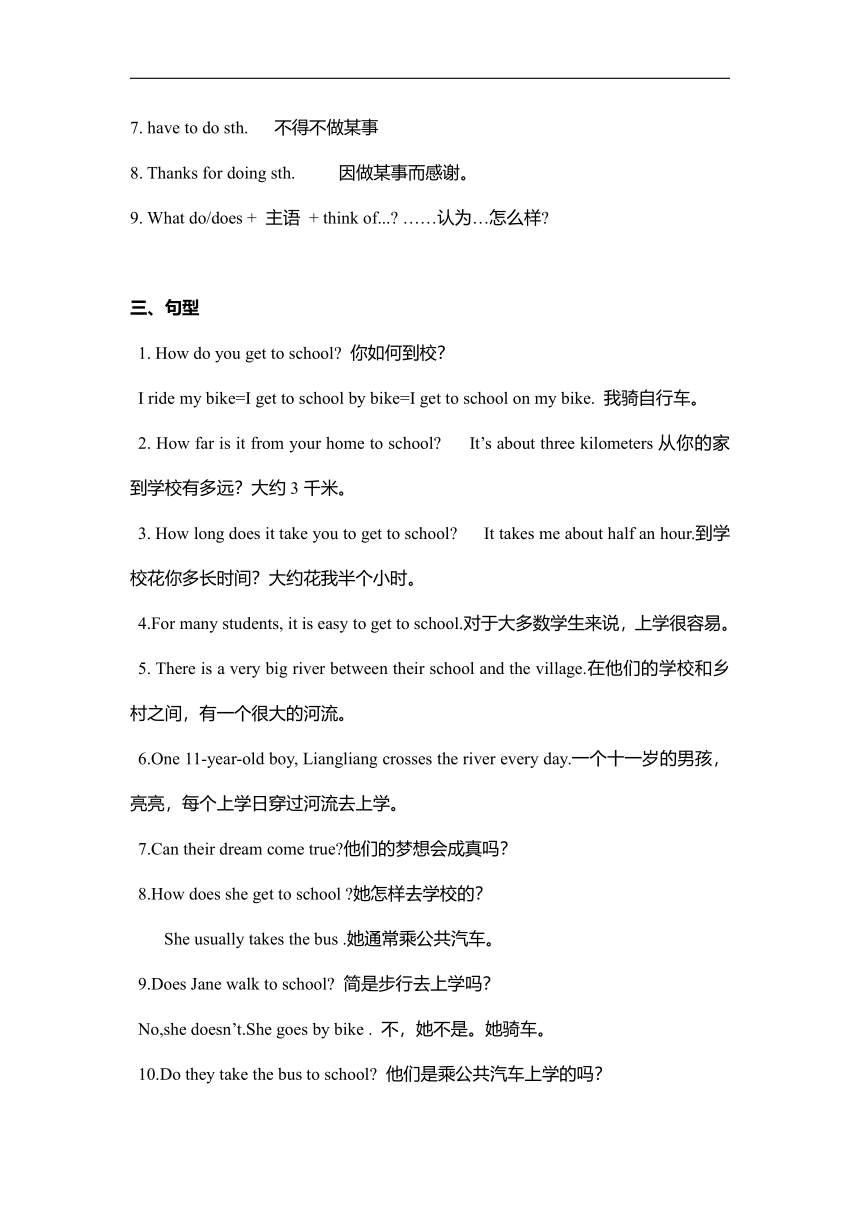
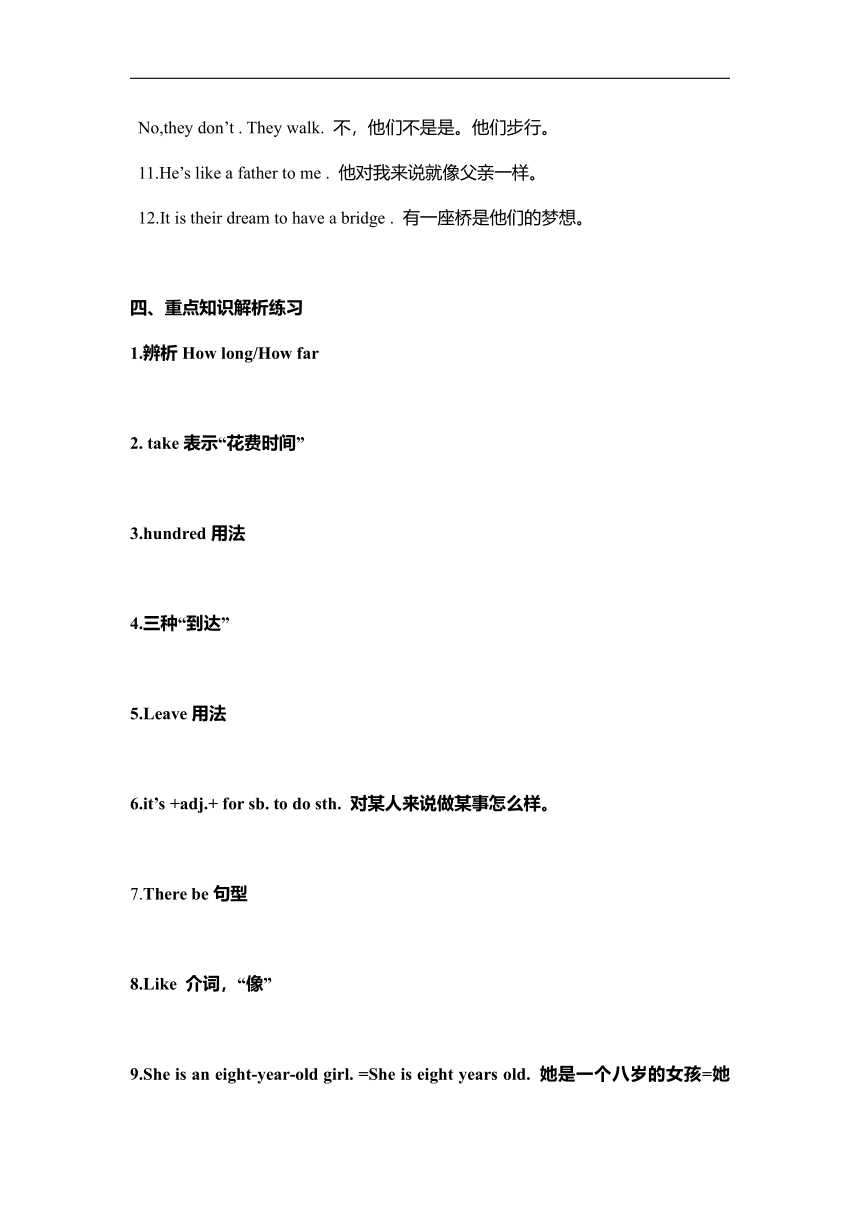
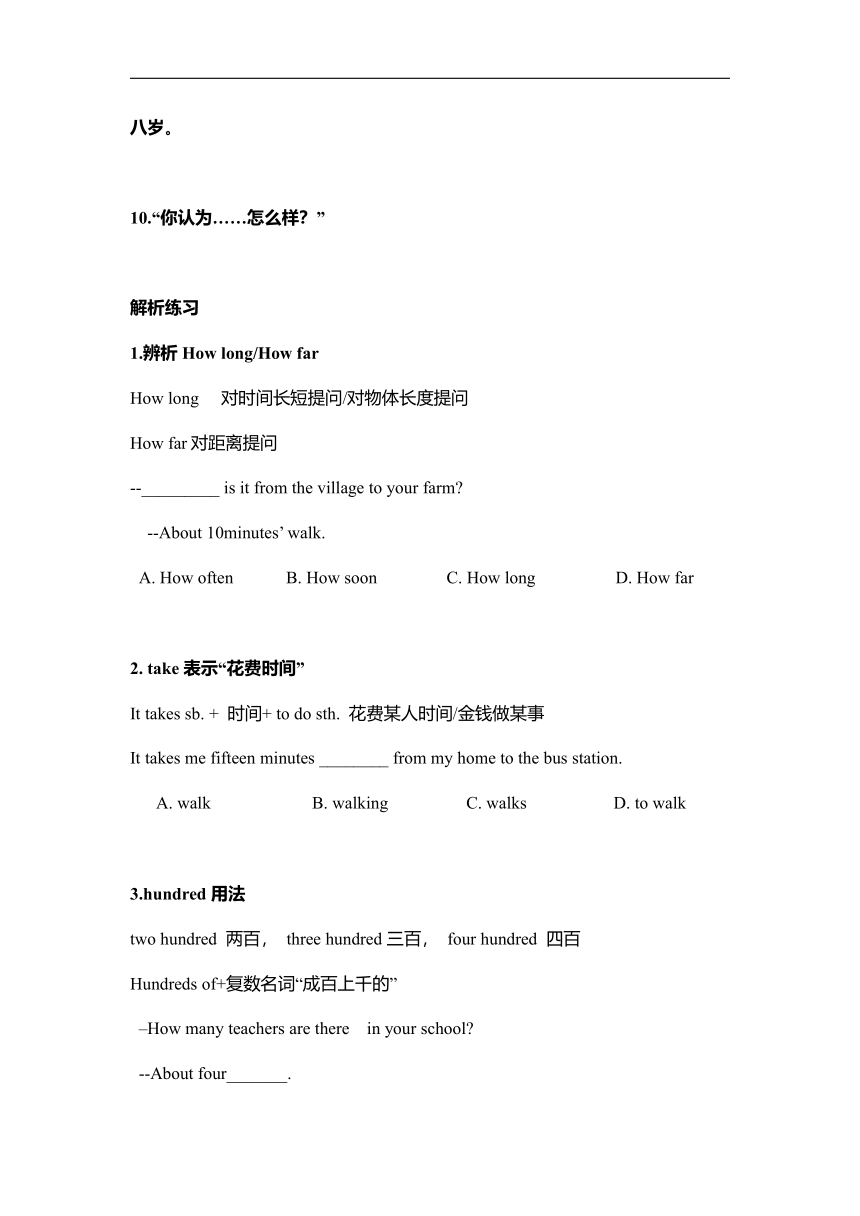
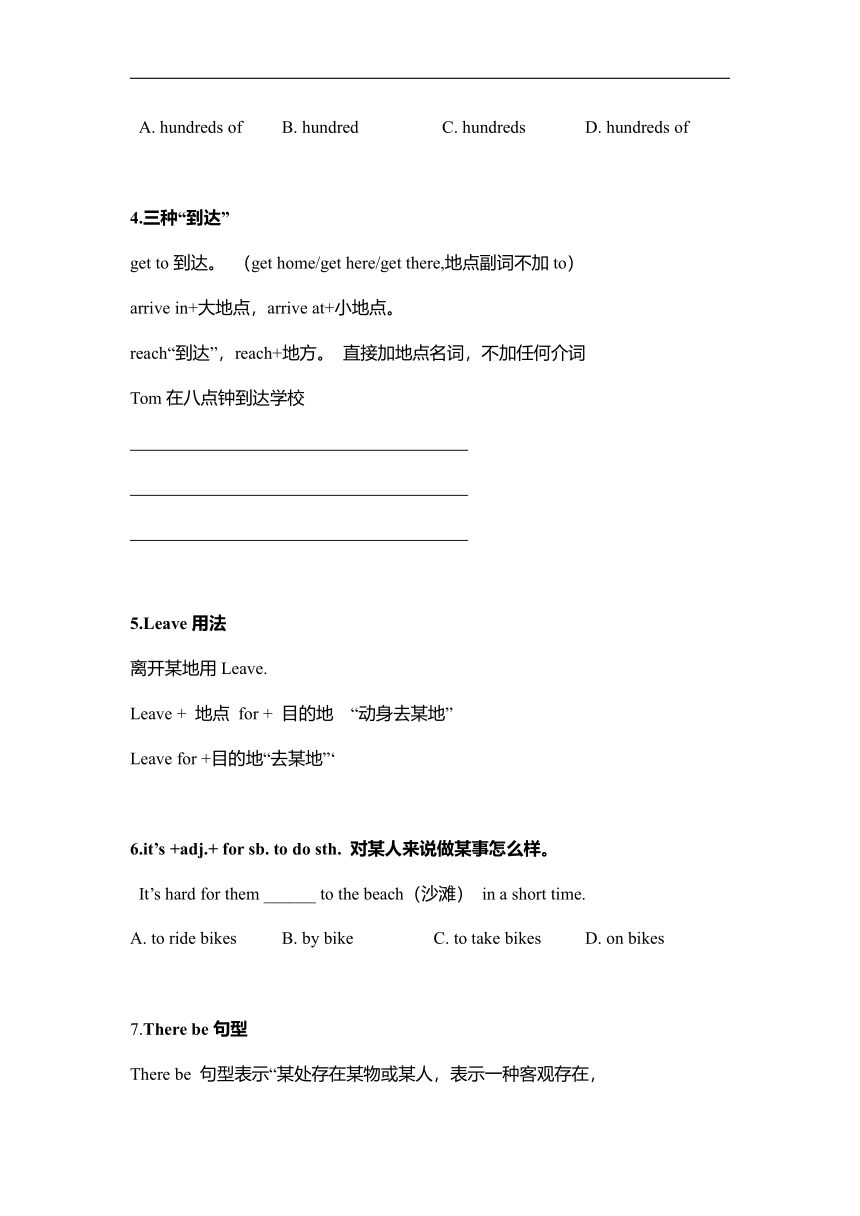
文档简介
Unit 3 How do you get to school
一、短语翻译
1.到学校 _____________________
2.乘火车 _____________________
3.骑自行车 _____________________
4.每天 _____________________
5.步行上学 _____________________
6.开车 _____________________
7.乘地铁 _____________________
8.乘公共汽车 ______________
9.多远 _____________________
10.多久 _____________________
11.火车站 _____________________
12.对许多学生而言 ______________
13.公共汽车站 ______________
14.认为;想起 ______________
15.在……和……之间 _____________
16.穿过河流 _____________________
17.乘索道 _____________________
18.地铁站 _____________________
19.害怕 _____________________
20.每个上学日 ___________
21.和……玩 _____________________
22.许多的 _____________________
23.实现;成为现实 _____________
24.离开家 _____________________
固定搭配
1. take...to... = go to...by... 乘……去……
2. How do/does...get to.. ……怎样到达……
3. How far is it from...to... 从……到……有多远
4. It takes sb. some time to do sth. 做某事花费某人一些时间。
5. How long does it take... ……花费多长时间
6. It is + adj. + to do sth. 做某事是……的。
7. have to do sth. 不得不做某事
8. Thanks for doing sth. 因做某事而感谢。
9. What do/does + 主语 + think of... ……认为…怎么样
三、句型
1. How do you get to school 你如何到校?
I ride my bike=I get to school by bike=I get to school on my bike. 我骑自行车。
2. How far is it from your home to school It’s about three kilometers从你的家到学校有多远?大约3千米。
3. How long does it take you to get to school It takes me about half an hour.到学校花你多长时间?大约花我半个小时。
4.For many students, it is easy to get to school.对于大多数学生来说,上学很容易。
5. There is a very big river between their school and the village.在他们的学校和乡村之间,有一个很大的河流。
6.One 11-year-old boy, Liangliang crosses the river every day.一个十一岁的男孩,亮亮,每个上学日穿过河流去上学。
7.Can their dream come true 他们的梦想会成真吗?
8.How does she get to school 她怎样去学校的?
She usually takes the bus .她通常乘公共汽车。
9.Does Jane walk to school 简是步行去上学吗?
No,she doesn’t.She goes by bike . 不,她不是。她骑车。
10.Do they take the bus to school 他们是乘公共汽车上学的吗?
No,they don’t . They walk. 不,他们不是是。他们步行。
11.He’s like a father to me . 他对我来说就像父亲一样。
12.It is their dream to have a bridge . 有一座桥是他们的梦想。
四、重点知识解析练习
1.辨析How long/How far
2. take表示“花费时间”
3.hundred用法
4.三种“到达”
5.Leave用法
6.it’s +adj.+ for sb. to do sth. 对某人来说做某事怎么样。
7.There be句型
8.Like 介词,“像”
9.She is an eight-year-old girl. =She is eight years old. 她是一个八岁的女孩=她八岁。
10.“你认为……怎么样?”
解析练习
1.辨析How long/How far
How long 对时间长短提问/对物体长度提问
How far 对距离提问
--_________ is it from the village to your farm
--About 10minutes’ walk.
A. How often B. How soon C. How long D. How far
2. take表示“花费时间”
It takes sb. + 时间+ to do sth. 花费某人时间/金钱做某事
It takes me fifteen minutes ________ from my home to the bus station.
A. walk B. walking C. walks D. to walk
3.hundred用法
two hundred 两百, three hundred三百, four hundred 四百
Hundreds of+复数名词“成百上千的”
–How many teachers are there in your school
--About four_______.
A. hundreds of B. hundred C. hundreds D. hundreds of
4.三种“到达”
get to到达。 (get home/get here/get there,地点副词不加to)
arrive in+大地点,arrive at+小地点。
reach“到达”,reach+地方。 直接加地点名词,不加任何介词
Tom在八点钟到达学校
5.Leave用法
离开某地用Leave.
Leave + 地点 for + 目的地 “动身去某地”
Leave for +目的地“去某地”‘
6.it’s +adj.+ for sb. to do sth. 对某人来说做某事怎么样。
It’s hard for them ______ to the beach(沙滩) in a short time.
A. to ride bikes B. by bike C. to take bikes D. on bikes
7.There be句型
There be 句型表示“某处存在某物或某人,表示一种客观存在,
have/has“有”,表示“某人拥有某物/某人”表主观拥有,其主语常是人。
There be如果后面接两个名词作主语,那么“be”的人称和数与邻近的名词一致。即be 用is还是are,取决于离该动词最近的那个名词。如果该名词是单数或不可数名词就用is,如果是复数就用are。
There a ruler,two pens and five erasers on the desk.
A.has B. is C.are D. have
8.Like 介词,“像”
9.She is an eight-year-old girl. =She is eight years old. 她是一个八岁的女孩=她八岁。
Kate is _____ girl. She is very happy at school.
a 18-year-old B. an 18-year-old
C. an 18-years-old D. a 18-years-old
10.“你认为……怎么样?”
What do you think of……?=How do you like……?
单元练习
一、单项选择
1. — How do you usually go to school
— By ______ bike, but sometimes I take _____ bus.
A. a; / B. a; the C. /; the D. /; a
2. — Q comes ______ P and R.
— Yes, you’re right.
A. between B. in C. by D. to
3. — ________ is it from your home to the subway station
— About two kilometers.
A. How far B. How many C. How long D. How much
4. No ________ crosses this long river, so they go on a ropeway.
A. story B. villager C. car D. bridge
5. — Can you _____ me home
— Sure. Get on!
A. drive B. walk C. leave D. live
6.It’s five kilometers from here to the village and every year of people like going there.
A.hundreds; hundreds B.hundred; hundred
C.hundred; hundreds D.hundreds; hundred
7. —I _____ 2 days finishing writing this poem. What about you
—It ____ me 5 hours to finish it.
spend; takes B.take; costs
C.take; spends D.spend; pays
8. ___ not easy for the children ___ such interesting stories to the old man.
A.It’s; telling B.It’s; tells
C.It’s; to tell D.That’s; to tell
9. ________ students think that they don’t have ____________ time to finish their homework.
A. Many; many B. Much; much C. Much; many D. Many; much
10. ____ do you think _____ Chinese education(教育)?
A.How; like B.What; of C.Where; of D.Who; about
二、完型
Dear Anna,
How’s it going My birthday is coming. And on ____1____ evening, I will have a birthday party in my house. I hope you can come. But it’s ____2____ easy to find my place. So now I tell you ____3____ you can get here.
Here is a ____4____. It can help you find where my house is. Go down Long Street and don’t turn left. Just walk straight for about five minutes, you can see a bus stop on your left. You can take the No. 5 bus and get off at the 5th stop. ____5____ you are on New Street. ____6____ along the street and you can see a ____7____. And the neighborhood I live in is ____8____ the bank. When you ____9____ the gate of my neighborhood, please call me. On Friday, the party will start at 6 o’ clock p.m. Many of my friends will come. And you can also bring your friends here. My mom will make many ____10____ delicious foods for us. We can sing and dance together. I think we can have a good time that day.
Yours,
Tina
1.A.Thursday B.Friday C.Saturday D.Sunday
2.A.not B.so C.much D.very
3.A.who B.when C.where D.how
4.A.street B.book C.map D.newspaper
5.A.And B.Then C.But D.Because
6.A.Walk B.To walk C.Walking D.explain
7.A.hotel B.hospital C.bank D.supermarket
8.A.in B.under C.behind D.from
9.A.get B.visit C.arrive in D.arrive at
10.A.kind of B.kinds of C.kind D.a kind of
三、用所给词的适当形式填空
1. A number of _________ (student) love English.
2. Canada is in North _________ (American).
3. Be _________ (quickly)! The train is leaving.
4. It's about two _________ (kilometer) from my home to the station.
5. David has _________ (many) books than Linda.
6.It usually takes him an hour________(ride) his bike to school.
7.How ________Tom ________ (get) to school every day
8.The old woman is ninety ________ (year) old now.
9.How long does it take ________ (walk) to the train station
10.The journey to the airport ________ (take) about 20 minutes.
四、根据汉语提示完成句子
1.这个十岁的女孩步行去上学。
The ________ girl _________ school.
2.从杰克的家到学校有多远?
______ is it from Jack's home to school
3.让他们的梦想成真的确很难。
It is really ________ to ________ their dreams ________.
4.—埃米通常怎么去动物园?—她乘地铁。
—_________________ Amy usually go to the zoo
—She ________________________.
5.骑自行车到学校要花费我半个小时。
___________________ half an hour __________________ a bike to school.
我不确定。
_______ _____ _______ .
7.---他们是坐公共汽车去学校的吗?---不是,他们步行去的。
---Do they _______ _____ _______ to school
---No,_______ _____ .They walk.
8.玛丽想知道他认为这段旅程怎么样。
Mary wants to know _______ _____ ______ _____ the trip.
9.对许多学生来说,到学校是容易的。
For many students,_______ _____ _______ _____ get to school.
10.(河上)没有桥梁,而且对于船只来说河水流动得太快了。
_______ _____ no bridge and the river _______ _____ _______ for boats.
五、句型转换
1.They can go there by boat. (对划线部分提问)
__________ __________ __________ go there
2.History is difficult and boring. (对画线部分提问)
________ do you ________ ________ history
3.It's about 20 minutes' walk from my home to school.(就划线部分提问)
__________ __________ is it from your home to school
4.Mr. Smith usually goes to work by car. (改为同义句)
Mr. Smith usually ________ his ________ to work.
5.His father drives his car to work every day.(改为同义句)
His father goes to work ________ ________every day.
一、短语翻译
1.到学校 _____________________
2.乘火车 _____________________
3.骑自行车 _____________________
4.每天 _____________________
5.步行上学 _____________________
6.开车 _____________________
7.乘地铁 _____________________
8.乘公共汽车 ______________
9.多远 _____________________
10.多久 _____________________
11.火车站 _____________________
12.对许多学生而言 ______________
13.公共汽车站 ______________
14.认为;想起 ______________
15.在……和……之间 _____________
16.穿过河流 _____________________
17.乘索道 _____________________
18.地铁站 _____________________
19.害怕 _____________________
20.每个上学日 ___________
21.和……玩 _____________________
22.许多的 _____________________
23.实现;成为现实 _____________
24.离开家 _____________________
固定搭配
1. take...to... = go to...by... 乘……去……
2. How do/does...get to.. ……怎样到达……
3. How far is it from...to... 从……到……有多远
4. It takes sb. some time to do sth. 做某事花费某人一些时间。
5. How long does it take... ……花费多长时间
6. It is + adj. + to do sth. 做某事是……的。
7. have to do sth. 不得不做某事
8. Thanks for doing sth. 因做某事而感谢。
9. What do/does + 主语 + think of... ……认为…怎么样
三、句型
1. How do you get to school 你如何到校?
I ride my bike=I get to school by bike=I get to school on my bike. 我骑自行车。
2. How far is it from your home to school It’s about three kilometers从你的家到学校有多远?大约3千米。
3. How long does it take you to get to school It takes me about half an hour.到学校花你多长时间?大约花我半个小时。
4.For many students, it is easy to get to school.对于大多数学生来说,上学很容易。
5. There is a very big river between their school and the village.在他们的学校和乡村之间,有一个很大的河流。
6.One 11-year-old boy, Liangliang crosses the river every day.一个十一岁的男孩,亮亮,每个上学日穿过河流去上学。
7.Can their dream come true 他们的梦想会成真吗?
8.How does she get to school 她怎样去学校的?
She usually takes the bus .她通常乘公共汽车。
9.Does Jane walk to school 简是步行去上学吗?
No,she doesn’t.She goes by bike . 不,她不是。她骑车。
10.Do they take the bus to school 他们是乘公共汽车上学的吗?
No,they don’t . They walk. 不,他们不是是。他们步行。
11.He’s like a father to me . 他对我来说就像父亲一样。
12.It is their dream to have a bridge . 有一座桥是他们的梦想。
四、重点知识解析练习
1.辨析How long/How far
2. take表示“花费时间”
3.hundred用法
4.三种“到达”
5.Leave用法
6.it’s +adj.+ for sb. to do sth. 对某人来说做某事怎么样。
7.There be句型
8.Like 介词,“像”
9.She is an eight-year-old girl. =She is eight years old. 她是一个八岁的女孩=她八岁。
10.“你认为……怎么样?”
解析练习
1.辨析How long/How far
How long 对时间长短提问/对物体长度提问
How far 对距离提问
--_________ is it from the village to your farm
--About 10minutes’ walk.
A. How often B. How soon C. How long D. How far
2. take表示“花费时间”
It takes sb. + 时间+ to do sth. 花费某人时间/金钱做某事
It takes me fifteen minutes ________ from my home to the bus station.
A. walk B. walking C. walks D. to walk
3.hundred用法
two hundred 两百, three hundred三百, four hundred 四百
Hundreds of+复数名词“成百上千的”
–How many teachers are there in your school
--About four_______.
A. hundreds of B. hundred C. hundreds D. hundreds of
4.三种“到达”
get to到达。 (get home/get here/get there,地点副词不加to)
arrive in+大地点,arrive at+小地点。
reach“到达”,reach+地方。 直接加地点名词,不加任何介词
Tom在八点钟到达学校
5.Leave用法
离开某地用Leave.
Leave + 地点 for + 目的地 “动身去某地”
Leave for +目的地“去某地”‘
6.it’s +adj.+ for sb. to do sth. 对某人来说做某事怎么样。
It’s hard for them ______ to the beach(沙滩) in a short time.
A. to ride bikes B. by bike C. to take bikes D. on bikes
7.There be句型
There be 句型表示“某处存在某物或某人,表示一种客观存在,
have/has“有”,表示“某人拥有某物/某人”表主观拥有,其主语常是人。
There be如果后面接两个名词作主语,那么“be”的人称和数与邻近的名词一致。即be 用is还是are,取决于离该动词最近的那个名词。如果该名词是单数或不可数名词就用is,如果是复数就用are。
There a ruler,two pens and five erasers on the desk.
A.has B. is C.are D. have
8.Like 介词,“像”
9.She is an eight-year-old girl. =She is eight years old. 她是一个八岁的女孩=她八岁。
Kate is _____ girl. She is very happy at school.
a 18-year-old B. an 18-year-old
C. an 18-years-old D. a 18-years-old
10.“你认为……怎么样?”
What do you think of……?=How do you like……?
单元练习
一、单项选择
1. — How do you usually go to school
— By ______ bike, but sometimes I take _____ bus.
A. a; / B. a; the C. /; the D. /; a
2. — Q comes ______ P and R.
— Yes, you’re right.
A. between B. in C. by D. to
3. — ________ is it from your home to the subway station
— About two kilometers.
A. How far B. How many C. How long D. How much
4. No ________ crosses this long river, so they go on a ropeway.
A. story B. villager C. car D. bridge
5. — Can you _____ me home
— Sure. Get on!
A. drive B. walk C. leave D. live
6.It’s five kilometers from here to the village and every year of people like going there.
A.hundreds; hundreds B.hundred; hundred
C.hundred; hundreds D.hundreds; hundred
7. —I _____ 2 days finishing writing this poem. What about you
—It ____ me 5 hours to finish it.
spend; takes B.take; costs
C.take; spends D.spend; pays
8. ___ not easy for the children ___ such interesting stories to the old man.
A.It’s; telling B.It’s; tells
C.It’s; to tell D.That’s; to tell
9. ________ students think that they don’t have ____________ time to finish their homework.
A. Many; many B. Much; much C. Much; many D. Many; much
10. ____ do you think _____ Chinese education(教育)?
A.How; like B.What; of C.Where; of D.Who; about
二、完型
Dear Anna,
How’s it going My birthday is coming. And on ____1____ evening, I will have a birthday party in my house. I hope you can come. But it’s ____2____ easy to find my place. So now I tell you ____3____ you can get here.
Here is a ____4____. It can help you find where my house is. Go down Long Street and don’t turn left. Just walk straight for about five minutes, you can see a bus stop on your left. You can take the No. 5 bus and get off at the 5th stop. ____5____ you are on New Street. ____6____ along the street and you can see a ____7____. And the neighborhood I live in is ____8____ the bank. When you ____9____ the gate of my neighborhood, please call me. On Friday, the party will start at 6 o’ clock p.m. Many of my friends will come. And you can also bring your friends here. My mom will make many ____10____ delicious foods for us. We can sing and dance together. I think we can have a good time that day.
Yours,
Tina
1.A.Thursday B.Friday C.Saturday D.Sunday
2.A.not B.so C.much D.very
3.A.who B.when C.where D.how
4.A.street B.book C.map D.newspaper
5.A.And B.Then C.But D.Because
6.A.Walk B.To walk C.Walking D.explain
7.A.hotel B.hospital C.bank D.supermarket
8.A.in B.under C.behind D.from
9.A.get B.visit C.arrive in D.arrive at
10.A.kind of B.kinds of C.kind D.a kind of
三、用所给词的适当形式填空
1. A number of _________ (student) love English.
2. Canada is in North _________ (American).
3. Be _________ (quickly)! The train is leaving.
4. It's about two _________ (kilometer) from my home to the station.
5. David has _________ (many) books than Linda.
6.It usually takes him an hour________(ride) his bike to school.
7.How ________Tom ________ (get) to school every day
8.The old woman is ninety ________ (year) old now.
9.How long does it take ________ (walk) to the train station
10.The journey to the airport ________ (take) about 20 minutes.
四、根据汉语提示完成句子
1.这个十岁的女孩步行去上学。
The ________ girl _________ school.
2.从杰克的家到学校有多远?
______ is it from Jack's home to school
3.让他们的梦想成真的确很难。
It is really ________ to ________ their dreams ________.
4.—埃米通常怎么去动物园?—她乘地铁。
—_________________ Amy usually go to the zoo
—She ________________________.
5.骑自行车到学校要花费我半个小时。
___________________ half an hour __________________ a bike to school.
我不确定。
_______ _____ _______ .
7.---他们是坐公共汽车去学校的吗?---不是,他们步行去的。
---Do they _______ _____ _______ to school
---No,_______ _____ .They walk.
8.玛丽想知道他认为这段旅程怎么样。
Mary wants to know _______ _____ ______ _____ the trip.
9.对许多学生来说,到学校是容易的。
For many students,_______ _____ _______ _____ get to school.
10.(河上)没有桥梁,而且对于船只来说河水流动得太快了。
_______ _____ no bridge and the river _______ _____ _______ for boats.
五、句型转换
1.They can go there by boat. (对划线部分提问)
__________ __________ __________ go there
2.History is difficult and boring. (对画线部分提问)
________ do you ________ ________ history
3.It's about 20 minutes' walk from my home to school.(就划线部分提问)
__________ __________ is it from your home to school
4.Mr. Smith usually goes to work by car. (改为同义句)
Mr. Smith usually ________ his ________ to work.
5.His father drives his car to work every day.(改为同义句)
His father goes to work ________ ________every day.
同课章节目录
- Unit 1 Can you play the guitar?
- Section A
- Section B
- Unit 2 What time do you go to school?
- Section A
- Section B
- Unit 3 How do you get to school?
- Section A
- Section B
- Unit 4 Don't eat in class.
- Section A
- Section B
- Unit 5 Why do you like pandas?
- Section A
- Section B
- Unit 6 I'm watching TV.
- Section A
- Section B
- Review of Units 1-6
- Unit 7 It's raining!
- Section A
- Section B
- Unit 8 Is there a post office near here?
- Section A
- Section B
- Unit 9 What does he look like?
- Section A
- Section B
- Unit 10 I'd like some noodles.
- Section A
- Section B
- Unit 11 How was your school trip?
- Section A
- Section B
- Unit 12 What did you do last weekend?
- Section A
- Section B
